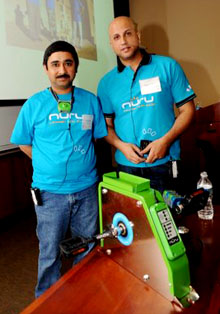Bright Idea
Poverty and a lack of access to safe, affordable lighting are two big challenges in the developing world. A new startup company hopes to solve those problems with an innovative product, and now, with the help of Tulane, it's a little closer to achieving that goal.

Sunil Bhardwaj, left, and Sameer Hajee hope to bring light and prosperity to East Africa with their innovative product. They won $50,000 in the Tulane Business Plan Competition. (Photo by Cheryl Gerber)
Nuru Light, a for-profit company affiliated with the University of California at Berkeley, was named the winner of Friday's (April 16) Tulane Business Plan Competition. In edging out two other finalists, Nuru Light earned a cash prize of $50,000.
“The prize is going to go toward the $500,000 we're looking to raise to deliver a container of our products and get them distributed,” said company executive Sameer Hajee.
While the competition previously featured two categories, one for traditional businesses and another for social entrepreneurship ventures, this year's competition changed to one focus on the principles of conscious capitalism.
Each plan in the competition, sponsored by the A. B. Freeman School of Business, had to demonstrate not just market potential but the ability to positively affect all stakeholders and the society in which the business operates.
Nuru Light plans to manufacture and distribute sturdy, affordable LED lights that can be recharged via a unique pedal generator in East Africa, where 90 percent of citizens live without electricity and use kerosene lamps. The company plans to work with microfinance institutions in East Africa to identify entrepreneurs who can generate income for themselves by selling the lights and then charging users a small fee for recharging services.
“Light, which we totally take for granted, can change a kid's life or a family's life, and it can be profitable,” said investor Gary Solomon, one of this year's judges.
Another judge, Crichton W. Brown, managing director of Advantage Capital, said the judges “loved the microfinance distribution strategy, and the social and health aspects of helping the population were overwhelming to us.”
Mark Miester is the editor of Freeman magazine for the A. B. Freeman School of Business.
